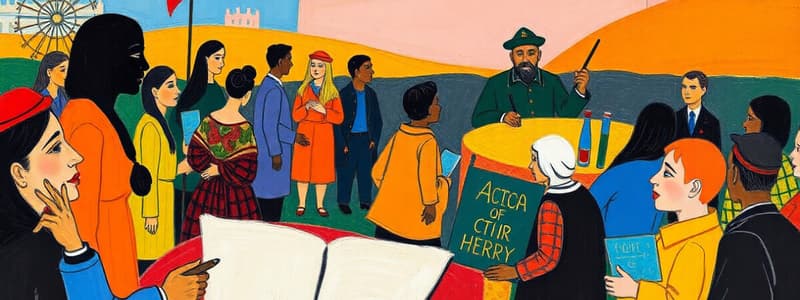Podcast
Questions and Answers
Which discipline most directly investigates the evolution of governmental structures within various societies?
Which discipline most directly investigates the evolution of governmental structures within various societies?
- Civics (correct)
- History
- Geography
- Economics
Understanding the 'where' of a historical event and its influence is primarily a function of which discipline?
Understanding the 'where' of a historical event and its influence is primarily a function of which discipline?
- History
- Economics
- Sociology
- Geography (correct)
Which subject area most directly explores the impact of scarcity on societal decision-making?
Which subject area most directly explores the impact of scarcity on societal decision-making?
- Civics
- Economics (correct)
- Geography
- History
Analyzing different interpretations of the same event using original documents is crucial to which field of study?
Analyzing different interpretations of the same event using original documents is crucial to which field of study?
The concept of 'human-environment interaction' is most directly explored within which social studies discipline?
The concept of 'human-environment interaction' is most directly explored within which social studies discipline?
Which field would most directly investigate the role of voting systems in a democracy?
Which field would most directly investigate the role of voting systems in a democracy?
A researcher studying the evolution of cultural traditions and their impact on societal values is primarily engaging with which discipline?
A researcher studying the evolution of cultural traditions and their impact on societal values is primarily engaging with which discipline?
Analyzing the distribution of resources and trade routes throughout history would be best described as what kind of analysis?
Analyzing the distribution of resources and trade routes throughout history would be best described as what kind of analysis?
Which concept is most directly concerned with the allocation of limited resources to satisfy unlimited wants?
Which concept is most directly concerned with the allocation of limited resources to satisfy unlimited wants?
A society transitioning from a feudal system to an industrial economy would be primarily studied under which sociological concept?
A society transitioning from a feudal system to an industrial economy would be primarily studied under which sociological concept?
What best exemplifies the use of critical thinking in social studies methodology?
What best exemplifies the use of critical thinking in social studies methodology?
Which of the following best describes the relationship between 'markets' in economics and 'social structure' in sociology?
Which of the following best describes the relationship between 'markets' in economics and 'social structure' in sociology?
A team of sociologists studying the impact of media representations on children's understanding of gender roles would primarily be researching the concept of:
A team of sociologists studying the impact of media representations on children's understanding of gender roles would primarily be researching the concept of:
Flashcards
Social Studies
Social Studies
An interdisciplinary field examining human societies through history, civics, geography, economics, and sociology.
Culture
Culture
Beliefs, values, customs, and traditions of a group of people.
Government
Government
Systems and institutions that make and enforce rules in a society.
Economics
Economics
Signup and view all the flashcards
Chronology
Chronology
Signup and view all the flashcards
Civics
Civics
Signup and view all the flashcards
Geography
Geography
Signup and view all the flashcards
Human-environment interaction
Human-environment interaction
Signup and view all the flashcards
Scarcity
Scarcity
Signup and view all the flashcards
Supply and Demand
Supply and Demand
Signup and view all the flashcards
Social Structure
Social Structure
Signup and view all the flashcards
Socialization
Socialization
Signup and view all the flashcards
Critical Thinking
Critical Thinking
Signup and view all the flashcards
Study Notes
Social Studies Overview
- Social studies is an interdisciplinary field combining history, civics, geography, economics, and sociology to understand human societies and cultures.
- It examines social structures, political systems, economic activities, and cultural expressions across different times and places.
- Social studies cultivates critical thinking, problem-solving, and civic engagement in students.
- Key concepts include:
- Culture: Beliefs, values, customs, and traditions of a group.
- Society: A group of people living together with shared beliefs and customs.
- Government: Systems and institutions that make and enforce rules.
- Economics: How societies produce, distribute, and consume goods and services.
History
- History studies past events and their significance.
- It provides insights into human development and change.
- History helps understand current issues and informs future decisions.
- Key historical concepts include:
- Chronology: Order of events.
- Causation: Relationships between events.
- Historical interpretation: Varying perspectives on events.
- Primary sources: Original documents.
- Secondary sources: Analysis of primary sources.
Civics
- Civics studies rights, responsibilities, and government in a democratic society.
- It explores principles of democracy, citizenship, and the rule of law.
- Key civics concepts include:
- Rights and responsibilities of citizens.
- Types of government (democracy, monarchy, dictatorship).
- Role of law and justice.
- Political processes.
Geography
- Geography studies the Earth's surface and its features.
- It explores the interaction between people and their environment.
- Key geographic concepts include:
- Location (absolute and relative).
- Place (unique characteristics).
- Human-environment interaction.
- Movement (of people, goods, ideas).
- Region (areas with shared characteristics).
Economics
- Economics studies how societies manage resources to meet needs and wants.
- It explores production, distribution, and consumption of goods and services.
- Key economic concepts include:
- Scarcity: Limited nature of resources.
- Supply and demand: Relationship between availability and desire.
- Markets: Mechanisms for exchange.
- Economic systems (capitalism, socialism, communism).
- Trade and globalization
Sociology
- Sociology studies human behavior and social interactions.
- It examines social groups, institutions, and processes.
- Key sociological concepts include:
- Social structure: Patterns of social relationships.
- Culture: Beliefs, values, and customs of a group.
- Socialization: Learning societal behaviors.
- Social change: How societies evolve.
- Social inequality: Differences in social status and resources.
Methodology in Social Studies
- Critical thinking: Objective analysis and reasoned judgments.
- Problem solving: Identifying issues and solutions.
- Research skills: Locating, evaluating, and using information.
- Communication skills: Effective sharing of ideas.
- Collaboration: Working with others to reach common goals.
Studying That Suits You
Use AI to generate personalized quizzes and flashcards to suit your learning preferences.




